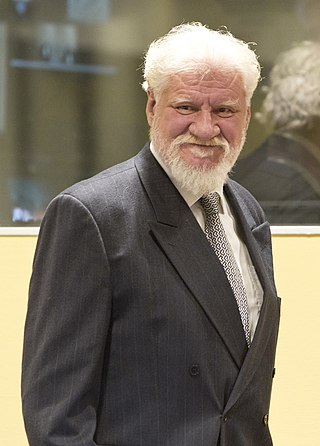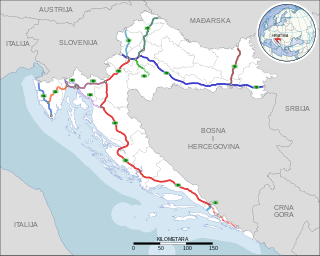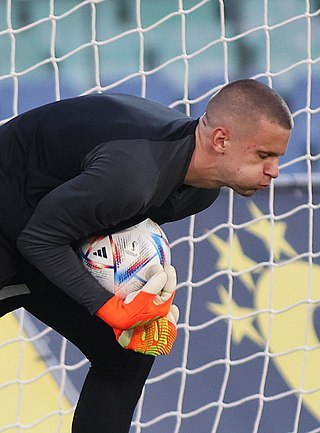
The economy of Bosnia and Herzegovina is a transitional, upper middle income economy. Bosnia and Herzegovina declared independence from socialist Yugoslavia on 1 March 1992. The main trading partners are Germany, Italy, Austria, Turkey and other neighboring Balkan countries.

The economy of Croatia is a high-income, service-based social market economy with the tertiary sector accounting for 70% of total gross domestic product (GDP). Croatia has a fully integrated and globalized economy. Croatia's road to globalization started as soon as the country gained independence, with tourism as one of the country's core industries dependent on the global market. Croatia joined the World Trade Organization in 2000, NATO in 2009, has been a member of the European Union since 1 July 2013, and it finally joined the Eurozone and the Schengen Area on 1 January 2023. Croatia is also negotiating membership of OECD organization, which it hopes to join by 2025. Further integration into the EU structures will continue in the coming years, including participation in ESA, CERN as well as EEA membership in the next 24 months.

The kuna was the currency of Croatia from 30 May 1994 until 31 December 2022. It was replaced by the euro in 2023. The kuna was subdivided into 100 lipa. It was issued by the Croatian National Bank and the coins were minted by the Croatian Mint.

The Pelješac Bridge is a cable-stayed bridge in Dubrovnik-Neretva County, Croatia. The bridge provides a fixed link from the southeastern Croatian semi-exclave to the rest of the country while bypassing Bosnia and Herzegovina's short coastal strip at Neum. The bridge spans the sea channel between Komarna on the northern mainland and the peninsula of Pelješac, thereby passing entirely through Croatian territory and avoiding any border crossings with Bosnia and Herzegovina at Neum.
Agrokor was a conglomerate, largely centered in agribusiness, with headquarters in Zagreb, Croatia. Founded in 1976 as a flower grower, it became a joint stock company in 1989, with 100 percent ownership held by founder Ivica Todorić. It greatly expanded its operations in the following 25 years by acquiring a number of large companies in Croatia and Southeast Europe. The Agrokor group had an annual sales revenue of €6.465 billion in 2015, which made it the second largest retail and eleventh largest overall company in all of Southeast Europe. As of 31 December 2017, Agrokor employed around 50,900 people. On 1 April 2019, the assets of the demised Agrokor were consolidated within the newly founded Fortenova Group.

Senijad Ibričić is a Bosnian former professional footballer who played as an attacking midfielder. Besides Bosnia and Herzegovina, he played in Croatia, Russia, Turkey, Macedonia, Iran, and Slovenia.

Slobodan Praljak was a Bosnian Croat convicted war criminal who served in the Croatian Army and the Croatian Defence Council, an army of the Croatian Republic of Herzeg-Bosnia, between 1992 and 1995. Praljak was found guilty of committing violations of the laws of war, crimes against humanity, and breaches of the Geneva Conventions during the Croat–Bosniak War by the International Criminal Tribunal for the former Yugoslavia (ICTY) in 2017.

Geofoto was a Croatian company with 260 employees headquartered in Zagreb, Croatia with subsidiaries in Norway, North Macedonia, Slovenia, Bolivia, Argentina, United Arab Emirates, Czech Republic and United Kingdom. Its main fields are Geomatics activities such as photogrammetry and geographic information systems (GIS). In Croatia it has won a number of business awards.

Highways in Croatia are the main transport network in Croatia. The Croatian classification includes several classes of highways:

Zdravko Mamić is a Croatian-Bosnian former football administrator and sports agent. From 2003 to 2016, he was the executive director of Croatian football club GNK Dinamo Zagreb.
Jamnica plus LLC is a Croatian limited liability company which produces carbonated mineral water, as well as other bottled waters and soft drinks. It was founded on 18 October 1828, and operates as a part of the Beverages Group, an organizational division within the Fortenova Group.

Energy in Croatia describes energy and electricity production, consumption and import in Croatia.

Čakovečki mlinovi is a Croatian milling company based in Čakovec. In addition to being the biggest producer of wheat flour in the country, it also produces baked goods and pumpkin seed oil. The company's shares are listed on the Zagreb Stock Exchange (ZSE) and is one of the 25 companies included in its official share index CROBEX as of September 2010.
Mirko Marić is a professional footballer who plays as a forward for Serie A club Monza.
Nomad Foods is an American-British frozen foods company, with its headquarters in the United Kingdom. The company's jurisdiction of incorporation is the British Virgin Islands. In 2015, Nomad acquired the Iglo Group. Five countries – the UK, Italy, Germany, France and Sweden – accounted for a combined 75% of its total sales in 2016.

Fortenova Group is a food producer and retailer based in Zagreb. It has been operating since 1 April 2019. The company was established through the implementation of the Settlement Plan closed between the creditors of Agrokor which had, due to illiquidity and over-indebtedness, ended up in pre-bankruptcy, managed through the Extraordinary Administration Procedure pursuant to the Act on Extraordinary Administration Procedures in Companies of Systemic Importance for the Republic of Croatia.

The COVID-19 pandemic in Bosnia and Herzegovina was a part of the worldwide pandemic of coronavirus disease 2019 caused by severe acute respiratory syndrome coronavirus 2. The virus was confirmed to have reached Bosnia and Herzegovina on 5 March 2020, when a patient in Banja Luka, who had travelled to Italy, tested positive. Later on the same day, a second case, who was the son of the first case, was reported. On 21 March, the first death in the country from COVID-19 was announced in a hospital in Bihać. The patient was an elderly woman who had been hospitalized two days before.

Dinko Horkaš is a Croatian professional footballer who plays as a goalkeeper for Bulgarian club Lokomotiv Plovdiv.

Kandit is a Croatian confectionery company producing chocolate and jelly products which is headquartered in Osijek. The company, together with Zvečevo and Kraš, made up 97% of the confectionery industry in 2020 Croatia. Exports make up 47% of Kandit's revenue. The company was acquired by Mepas of Bosnia and Herzegovina in 2011 for 6 million euros.















